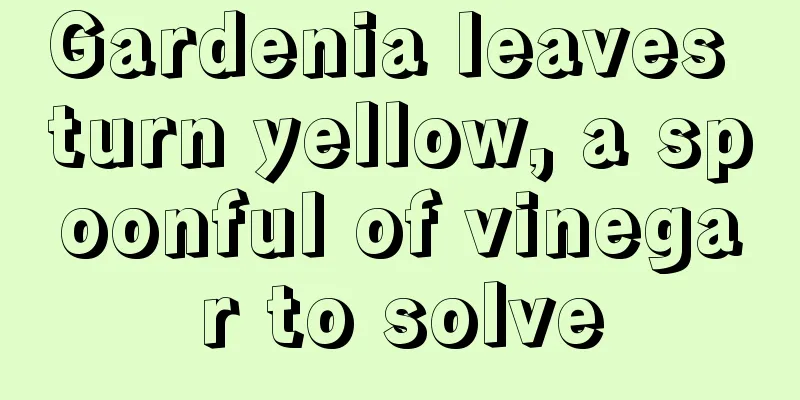Gardenia leaves turn yellow, a spoonful of vinegar to solve

|
Friends who often grow gardenias in the north may know that its leaves are very prone to turning yellow. This is mainly because gardenia is originally a southern plant and prefers acidic soil, but the soil and water in the north are generally alkaline, so it will lead to the problem of yellow leaves. But this problem is actually very easy to solve. Just a spoonful of vinegar is enough. So how should you use this spoonful of vinegar? Let’s learn more about it below. Gardenia leaves turn yellow, a spoonful of vinegar to solve If the yellowing leaves of gardenias are indeed caused by soil pH problems, you can dilute a spoonful of balsamic vinegar with water (the concentration can be thinner, generally 200 times dilution is enough) and pour it into the roots of the gardenia. Do this every three days. Using it several times in a row can overcome the yellowing leaves caused by soil alkalinity. Precautions for watering gardenia with vinegar 1. Choice of vinegar Before watering your gardenia with vinegar, make sure the vinegar you are using does not contain salt. Salt is a big taboo in growing flowers. Salt will absorb water. When flowers encounter salt, they will soon wither and die. So, remember, don't use vinegar with salt. It is recommended to use rice vinegar or white vinegar, which does not contain salt, to water gardenias. 2. Pay attention to frequency It is not advisable to water gardenias with vinegar too frequently, generally once a week is sufficient. If the plant shows symptoms such as yellow leaves or wilting leaves, the frequency can be increased appropriately, but it should not exceed once every three days. 3. Usage time It is best to water the gardenia with vinegar in the morning on a sunny day to avoid damage to the gardenia during high temperatures. 4. Pour vinegar on the area Be careful not to get the vinegar on the gardenia's leaves and flowers, as this may damage them. Because vinegar is an acid, it may cause damage to plant tissue if sprayed directly on gardenia leaves and flowers. It is generally recommended to dilute the solution and then water it to the roots of the gardenia. 5. Do not fertilize immediately after pouring vinegar After watering gardenia with vinegar, it is generally necessary to apply other fertilizers after 7 days. This is because it takes some time for the acetic acid to be fully absorbed by the soil and stabilize the soil's pH. During this period, you can observe the growth of gardenias. If you find any abnormalities, you should adjust the fertilization plan in time. In general, the role of a spoonful of vinegar is to help gardenias adjust the pH of the soil to avoid the problem of yellow leaves. Of course, there are many other reasons for the yellowing of gardenia leaves, such as yellowing leaves due to iron deficiency, yellowing leaves due to water accumulation, yellowing leaves due to excessive fertilizer, etc. Therefore, vinegar is not a panacea, and you must pay attention to how to use it.
|
<<: Will Impatiens die in winter? How to grow it in winter
>>: Does Impatiens have high requirements for light? What kind of environment does it like?
Recommend
Can calla lilies be grown in the bedroom?
1. Can I keep a bedroom? Calla lily, which we oft...
Cucumber high yield management method
Many cucumber growers have reported that the grow...
How to water canna throughout the year
How to water canna in spring As winter turns to s...
What kind of plants are small shrubs?
1. What kind of plant is it? Small shrubs refer t...
How to grow ornamental peppers at home to get more fruits (cultivation methods and precautions for ornamental peppers)
Ornamental peppers are also known as colorful pep...
How to grow banyan trees
1. Breeding methods 1. Light: It is suitable for ...
How to adapt Jade Plant to the pot?
How to acclimate Jade Dew Step 1: The editor purc...
Does Tiger Eye Dieffenbachia bloom?
Flowering period of Ornithogalum Tiger eye evergr...
What's wrong with the yellow leaves of the newly planted Monstera?
1. Inadaptability Reason: The newly planted Monst...
How to breed Xiaoyu
1. Maintenance methods 1. Temperature: It can wit...
Do rubber trees like the sun?
Rubber tree likes sunshine Rubber trees love sunl...
Can roses be planted in pots?
Can roses be planted in flower pots? Roses can be...
How to grow Metasequoia bonsai
1. Breeding environment 1. Soil: It is best to us...
The profit per mu of sea gold sand planting is how much profit can you make by planting one mu of sea gold sand artificially?
The price of sea sand is relatively expensive. It...
The legend of Jacaranda
legend On a street in Dehua, a small mountain cit...









